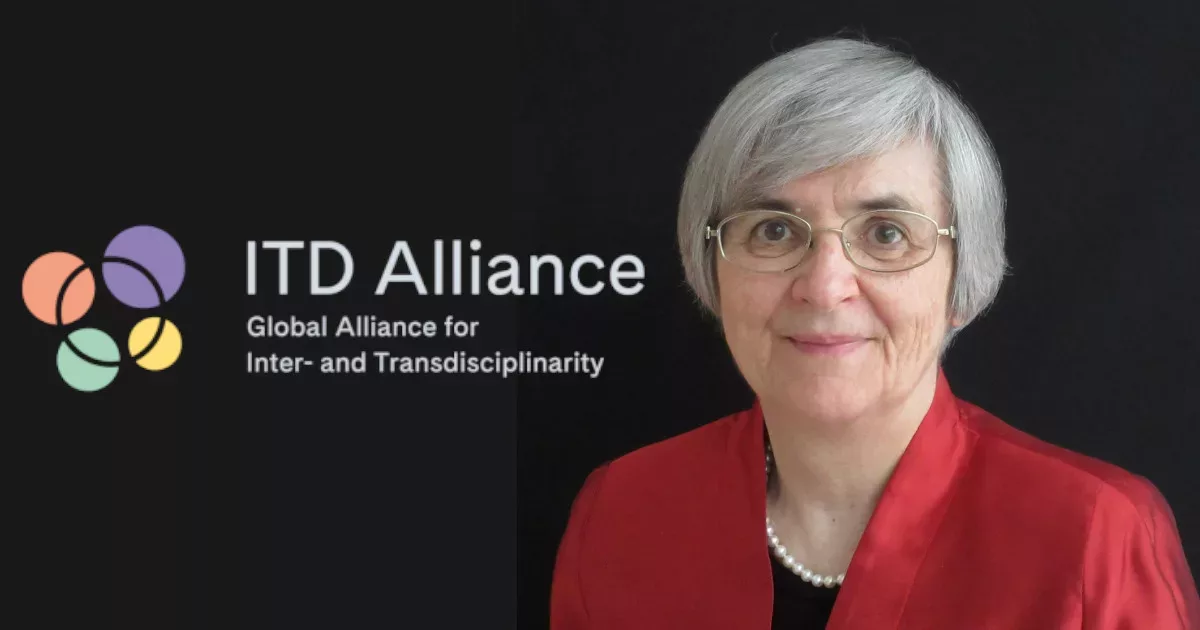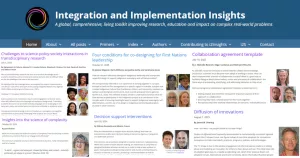Gabriele Bammer: “We develop approaches for tackling complex problems”
If you are interested in crossing disciplines, in working with the people who are affected by complex societal or environmental problems, and with decision makers, you should join!

What is the Global Alliance for Inter- and Transdisciplinarity?
Gabriele Bammer: We have two major purposes. One is to be a professional society for people who consider themselves to be inter- and transdisciplinarians. The other is still an aim, namely to help establish a peak body for all the different groups that develop approaches for tackling complex problems like sustainability. This obviously involves the inter and transdisciplinarians, and also the convergence researchers, the post normal scientists, the action researchers, the systems thinkers, etc. There is a long list of approaches, and we are all developing theory and methods that overlap, but we all have our own silos.
Why?
G. B.: For two reasons. One is that it’s important from a scholarly perspective, for doing good work and not reinventing the wheel. For example, transdisciplinarians often start thinking about problems as systems, so rather than reinventing systems thinking transdisciplinarians should be collaborating with systems thinkers. It is also important from a political perspective: if we want science for sustainability to become accepted and to use the kinds of methods and concepts and theories that have been developed, then we need to be an influential group, and for that size matters. Being a number of small groups is hopeless, because nobody can find us, and because we have no voice at the research policy and funding tables.
You mean, on the last point, even regarding the institutions you are working with, transdisciplinarity is not regarded well enough?
G. B.: It depends, institutions vary, with some embracing transdisciplinarity or one of these other approaches and some not interested. If we look at global bodies, the International Science Council, for instance, is really taking transdisciplinarity seriously, which is fantastic. But there are other major organizations that set the research agenda that don’t pay any attention to transdisciplinarity at all, or very little to these different ways of doing science.
What are the differences between transdisciplinarity, system thinking, action research, etc?
G. B.: Let me talk about our similarity: we are all interested in crossing disciplines, in working with the people who are affected by the complex societal or environmental problem, and in working with decision makers to do something about the problem. Those three things unite transdisciplinarity, interdisciplinarity, systems thinking, action research, post-normal science, implementation science, team science, etc. In terms of differences, each approach puts the focus in different places: transdisciplinarians on co-production, systems thinkers on connections, boundaries and interrelationships, action researcher on giving power to those affected by the problem, so they try to take the back seat as researchers and really push forward the people with the problem to help them get power and to solve the problem for themselves. These are three examples. We are all doing the same thing, but with different emphases. And in any research project, one approach is just too narrow.
Where can sustainability be present in this community of approaches?
G. B.: All the approaches that I talked about deal with sustainability and all also deal with a whole range of other complex problems. In fact, sustainability science is another one of those approaches and I just haven’t mentioned it. The thing that defines these approaches is that we support methodological and theoretical development to deal with systems, context, uncertainty, pluralism, integration, change, decision making, communication, working together etc. There are plenty of people dealing with sustainability problems who are good at the science, and what these approaches aim to do is help them efficiently work with other disciplines, affected communities and decision makers, by providing relevant easy-to-access theory and methods, so they don’t have to reinvent them.
One could imagine that the approaches you described could be at the service of goals very different from sustainability, and perhaps even opposite.
G. B.: Yes. For instance, you can see the Manhattan project that built the nuclear bomb in World War II as a transdisciplinary project: an alliance between a number of physical science and broader disciplines, working with the military. It’s important to say that for transdisciplinarians, systems thinkers and proponents of other approaches, being clear and transparent about your values is critical. So, if you are working against sustainability, you are doing it knowing full well what you are doing.
Do you think that the status of the non-scientific stakeholders that researchers collaborate with, be they associations, citizens or private companies, makes a difference to the status of the science?
G. B.: It is a really important question. The non-scientific stakeholders provide different perspectives on the problem and potential actions that can be taken. How representative they are (especially citizens) and how influential they are (especially those who are in a position to take action) can massively affect how well the problem is understood and how effective the actions are.
ITD-Alliance is a member of The Earth Humanity Coalition. What do you expect from this membership?
G. B.: Sustainability is a big, complex problem, and it is fantastic that The Earth-Humanity Coalition recognizes that transdisciplinarity and all those allied approaches are important. What we want is to be able to contribute and provide shortcuts for people who are in the coalition and who are unfamiliar with these approaches, so that they do not have to reinvent the wheel. The ITD Alliance can provide a conduit to all the other approaches, e.g. systems thinking, action research, post-normal science etc.
On the other way, do you expect something from other members?
G. B.: We are a new organization. Many EHC members are peak bodies that have been around for a long time. Watching how they operate is a huge lesson for us. It is really enlightening.
Let’s talk now about your planned activities in 2025. What are your plans for the coming months?
G. B.: Most of our activity happens through working groups. We have three established working groups and two new ones that are about to be established. The established working groups focus on 1) early career researchers, 2) integration experts and expertise i.e. when you have got a diverse set of perspectives, how do you bring them together to do something meaningful and who can do this?, 3) toolkits and methods. The third group looks at what toolkits are already available? How to establish a new toolkit? Could it be better to repurpose an existing toolkit? How can funders be encouraged to support the maintenance of existing toolkits rather than always funding new ones.
And about the new working groups?
G.B.: One is on education and training, bringing together all the different groups around the world who are interested in education and training, particularly focusing on transdisciplinarity. And then we have a working group that is interested in organizational change: how do organizations become better homes for inter and transdisciplinarity? How do we help people who want to do that kind of work, and who are located in a university that is not supportive? How do we help universities that are supportive to move forward?
Do you have other projects and activities?
G. B.: The other thing that we are doing is establishing regional networks. We already have a regional network in the Oceania region and it will run a webinar on the 1st of May focused on education and training, particularly in our region. We have two universities in Australia which are among the pioneers of doing transdisciplinary education on a whole university basis for all undergraduates. Courses for a limited number of students are very common, but having all students, at the end of their undergraduate degree, know how to deal with complex problems is much more ambitious.
In which other parts of the world are you establishing networks?
G.B.: We plan to cover all the major regions. Right now the main energy is in Africa, where members in Nigeria are looking at establishing an African regional network, and the Middle East and North Africa, where Egyptian members are looking at establishing a regional network. Our aim as an Alliance is to move forward globally, and to avoid developing everything in the Global North, ignoring all the value that can come from the Global South. Instead, we want to celebrate diversity, different cultures and perspectives and create the possibility that we all learn from each other.
Interview by Luc Allemand
SUBSCRIBE TO OUR NEWSLETTER
To stay up to date with our projects and the development of the EHC
Read more articles

Gian Francesco Giudice: “Ethical responsibility is essential in fundamental research”
From hypothetical black holes to environmental impact studies, CERN navigates risk, transparency, and moral responsibility at the frontiers of human

Dealing with the complexity of society and environment
A global toolkit for tackling complex problems with more than 600 different methods Ever wish you had a free toolkit

The Moon & the Global South: Voices, Risks & Promise
Researchers warn that without inclusive governance, the Moon could become “a new arena for old patterns of exclusion” When rockets

Borko Furht: “AI shouldn’t be given much autonomy without maintaining accountability”
Beyond Superintelligence: The Real Challenges of Keeping Humans ‘In the Loop’ Borko Furht is a professor in the department of